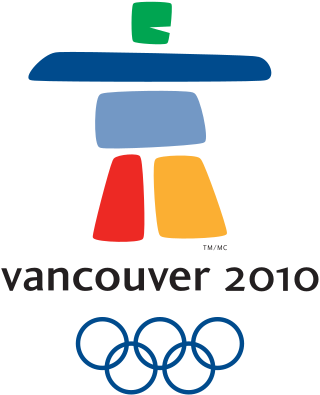The CTV Television Network, commonly known as CTV, is a Canadian English-language terrestrial television network. Launched in 1961 and acquired by BCE Inc. in 2000, CTV is Canada's largest privately owned television network and is now a division of the Bell Media subsidiary of BCE. It is Canada's largest privately or commercially owned network consisting of 22 owned-and-operated stations nationwide and two privately owned affiliates, and has consistently been placed as Canada's top-rated network in total viewers and in key demographics since 2002, after several years trailing the rival Global Television Network in key markets.

CBC Television has aired National Hockey League (NHL) broadcasts under the Hockey Night in Canada brand that is primarily associated with its Saturday night NHL broadcasts throughout its history in various platforms.

The 2010 Winter Olympics, officially known as the XXI Olympic Winter Games and also known as Vancouver 2010, were an international winter multi-sport event held from February 12 to 28, 2010 in Vancouver, British Columbia, Canada, with some events held in the surrounding suburbs of Richmond, West Vancouver and the University of British Columbia, and in the nearby resort town of Whistler. It was regarded by the Olympic Committee to be among the most successful Olympic games in history, in both attendance and coverage. Approximately 2,600 athletes from 82 nations participated in 86 events in fifteen disciplines. Both the Winter Olympic and Paralympic Games were organized by the Vancouver Organizing Committee (VANOC), headed by John Furlong. The 2010 Winter Games were the third Olympics to be hosted by Canada, and the first to be held within the province of British Columbia. Canada had hosted the 1976 Summer Olympics in Montreal, Quebec, and the 1988 Winter Olympics in Calgary, Alberta.

The 1988 Winter Olympics, officially known as the XV Olympic Winter Games and commonly known as Calgary 1988, were a multi-sport event held from February 13 to 28, 1988, in Calgary, Alberta, Canada. It was the first Winter Olympic Games to be held for 15 days, like the counterpart Summer Olympic Games. The majority of the contested events took place in Calgary itself. However, the skiing events were held west of the city at the Nakiska ski resort in Kananaskis Country and the Canmore Nordic Centre Provincial Park in the town of Canmore.
Sportsnet is a Canadian English-language discretionary sports specialty channel owned by Rogers Sports & Media. It was established in 1998 as CTV Sportsnet, a joint venture between CTV, Liberty Media, and Rogers Media. CTV parent Bell Globemedia then was required to divest its stake in the network following its 2001 acquisition of competing network TSN. Rogers then became the sole owner of Sportsnet in 2004 after it bought the remaining minority stake that was held by Fox.
The Olympic Oval in Calgary, Alberta, Canada, is North America's first covered speed skating oval; it was built for the 1988 Winter Olympics and opened 37 years ago on September 27, 1987. Located on the University of Calgary campus, it is the official designated training centre for Speed Skating Canada and the Elite Athlete Pathway.
Johnny Esaw, CM was a Canadian of Assyrian descent, a sports broadcaster and television network executive. He was a pioneer of sports broadcasting in Canada, best known for his involvement with figure skating, football, and international hockey.
NHL on CTV is the name of a former television program that broadcast National Hockey League games on the CTV Television Network.

The Olympic Games have been broadcast on television since the 1936 Summer Olympics.
The Olympic Games have been televised in the United States since 1960. It has become one of the most popular programs on USA television every four and then two years. The Olympics has been exclusively broadcast on NBC and NBCUniversal's TV networks in the United States since 1988 for the Summer Olympics and 2002 for the Winter Olympics. American television companies are one of the major sources of revenue for the IOC.

The Calgary Olympic Development Association (CODA), operating as WinSport, is a non-profit organization based in Calgary, Alberta, Canada whose mandate is to provide training and development to Canada's Olympic athletes, and to maintain the facilities built for the 1988 Winter Olympics. The organization was founded in 1956 to bring the Olympics to Calgary, succeeding in its fourth attempt. WinSport has been credited with dramatically improving Canada's performance at the Olympics, as medal totals have increased at each subsequent Winter Games held since 1988, to a peak of 26 in the 2010 Winter Olympics.
NHL on Global was the de facto name of a television program that broadcast National Hockey League games on the Global Television Network. The program aired during the 1987 and 1988 Stanley Cup playoffs under the titles Stanley Cup '87 and Stanley Cup '88 respectively.
The broadcasts of Summer and Winter Olympic Games produced by CBC Sports is shown on CBC Television and heard on the CBC's radio networks in Canada. The CBC was the broadcaster of the 2014, 2016, 2018, 2020 and 2022 Olympics.

Established in 2007, Canada's Olympic Broadcast Media Consortium was a joint venture set up by Canadian media companies Bell Media and Rogers Media to produce the Canadian broadcasts of the 2010 Winter Olympics in Vancouver, British Columbia, Canada, and the 2012 Summer Olympics in London, England, as well as the two corresponding Paralympic Games. Bell owned 80% of the joint venture, and Rogers owned 20%.

The selection process for the 1988 Winter Olympics consisted of three bids, and saw Calgary, Alberta, Canada, be selected ahead of Falun, Sweden, and Cortina d'Ampezzo, Italy. The selection was made at the 84th International Olympic Committee (IOC) Session in Baden-Baden, West Germany, on 30 September 1981.
During the 1979–80 and 1980–81 seasons, four more Canadian teams, the Edmonton Oilers, Quebec Nordiques, Winnipeg Jets, and Calgary Flames, joined the NHL. The Oilers and Flames were featured frequently as the two teams were contenders the 1980s; in contrast, as the Nordiques were owned by Carling-O'Keefe, a rival to the show's sponsor Molson and whose English-speaking fanbase was very small, the Nords were rarely broadcast, and never from Quebec City during the regular-season.
Since 2000, the CBC has aired an annual special Hockey Day in Canada broadcast to celebrate the game in Canada. The broadcast includes hockey-related features all afternoon, leading up to a tripleheader of NHL action featuring the seven Canadian teams. One exception was the 2008 edition that featured four games including two American teams along with the six Canadian teams; this was due to the NHL's schedule format at the time, as there was no inter-conference games between Canadian teams. Lead commentators, Don Cherry and Ron MacLean broadcast from a remote area. The broadcast includes live broadcast segments from smaller communities right across the country and features panel discussions on issues facing "Canada's game" at both the minor and pro levels. The day is usually in mid-February, but was broadcast in early January in 2002 and 2006 due to the 2002 Winter Olympics and 2006 Winter Olympics, respectively; the 2007 event was also held in January, though no sporting events key to Canada were scheduled.
Donald MacPherson was a Canadian broadcast executive who served as head of First Choice from 1981 to 1984 and CBC Sports from 1984 to 1988.
The Olympiques Calgary Olympics '88 (OCO'88), originally incorporated as XV Olympic Winter Games Organizing Committee was the organization responsible for overseeing the planning and development of the 1988 Winter Olympic Games.






